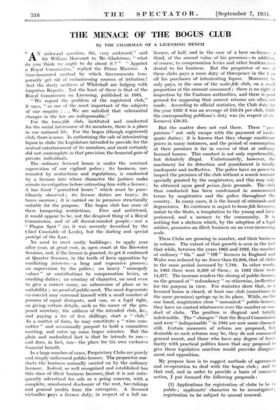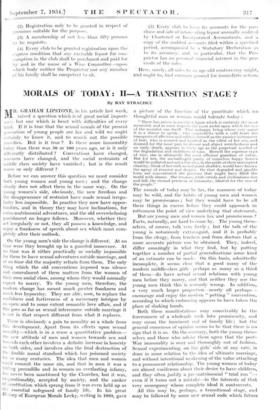THE MENACE OF THE BOGUS CLUB
By THE CHAIRMAN OF A LICENSING BENCH
"AN awkward question, Sir, very awkward," said Sir William Harcourt to Mr. Gladstone, "what do you think we ought to do about it ? " "Appoint a Royal Commission," replied the Prime Minister. A time-honoured method by which Governments tem- porarily get rid of embarrassing sources of irritation I And the dusty archives of Whitehall are bulging with forgotten Reports. Not the least of these is that of the Royal Commission on Licensing, published in 1931.
"We regard the problem of the registered club," it says, "as one of the most important of the subjects of our enquiry . . We are satisfied that substantial changes in the law are indispensable."
For the bona-fide club, instituted and conducted for the social intercourse of its members, there is a place in our national life. For the bogus (though registered) club, there is none. In authorizing the sale of intoxicating liquor in clubs the Legislature intended to provide for the mutual entertainment of its members, and most certainly did not contemplate in that provision the financial gain of private individuals.
The ordinary licensed house is under the constant supervision of our vigilant police ; its business, sur- rounded by restrictions and regulations, is conducted by a licensee into whose character the justices make minute investigation before entrusting him with a licence ; it has fixed "permitted hours" which must be punc- tiliously observed ; its licence duties are heavy, its taxes onerous ; it is carried on in premises structurally suitable for the purpose. The bogus club has none of these hampering restrictions. Free and unfettered, it would appear to be, not the despised thing of a Royal Commission, and of all decent-minded people,—nor a "Plague Spot" (as it was recently described by the Chief Constable of Leeds), but the darling and special protege of the Law.
No need to erect costly buildings ; to apply year after year, at great cost, in open court at the Brewster Sessions, and, if the licence is granted, to get it confirmed at Quarter Sessions, in the teeth of keen opposition by conflicting interests—a long and expensive process ; no supervision by the police ; no heavy "monopoly values" or contributions to compensation levies, or crushing duties ; no scrutiny of character, no need even to give a correct name, no submission of plans as to suitability ; no proof of public need. The most degenerate ex-convict may surround himself with a small number of persons of equal disrepute, and can, as a legal right, on giving certain details, such as the name of the pro- posed secretary, the address of the intended club, &c., and paying a fee of five shillings, start a " club." As a matter of form, he may constitute a "wine com- mittee" and occasionally purport to hold a committee meeting, and enter up some bogus minutes. But the plain and undoubted fact is that he intends to run— and does, in fact, run—the place for his own exclusive financial benefit.
In a large number of cases, Proprietary Clubs are purely and simply unlicensed public-houses. The proprietor con- ducts the business normally • carried on by the ordinary licensee. Indeed, so well recognized and established has this class of illicit business become;„, that it is not infre- quently advertised for sale as a going concern, with a complete, unashamed disclosure of the rent, bar-takings and general profits from the enterprise. A licensed victualler pays a licence duty, in respect of a full on- licence, of half, and in the case of a beer on-licence, a third, of the annual value of his premises—in addition, of course, to compensation levies and other burdens dental to his business. But the proprietor of one of these clubs pays a mere duty of threepence in the V on all his purchases of intoxicating liquor. Moreover, he only pays, in the case of the mak-fide club, on a small proportion of the amount consumed ; there is no right of inspection by the Customs authorities, and there is good ground for supposing that correct returns are often not made. According to official statistics, the Club duty for the year 1932-3 was an average of £10.24 per club, while the corresponding publican's duty was (in respect of on- licences) t50.35.
But the matter does not end there. These " pro- prietors " not only escape with the payment of inade- quate duties ; it is known that they charge exorbitant prices in many instances, and the period of consumption at their premises is far in excess of that at ordinary licensed houses. This conduct is not only reprehensible, but definitely illegal. Unfortunately, however, the machinery for its detection and punishment is totally inadequate and ineffective. - The police have no power to inspect the premises of the club without a search warrant specially granted by the magistrates, and this may only be obtained upon good prima facie grounds. The club thus conducted has been condemned in unmeasured terms by magistrates and the police throughout the country. In many cases, it is the haunt of criminals and degenerates. Its existence is unjust to bona-fide licensees, unfair to the State, a temptation to the young and inex- perienced, and a menace to the community. It is nothing but a shebeen which, by the adoption of a legal artifice, promotes an illicit business on an ever-increasing scale.
These Clubs are growing in number, and their business in volume. The extent of that growth is seen in the fact that while, between the years 1905 and 1932, the number of ordinary " On " and " Off " licences in England and Wales was reduced by no fewer than 25,893, that of clubs in the same period increased by 7,786. In other words, in 1905 there were 6,589 of them ; in 1932 there were 14,377. The increase renders the closing of public-houses, on the ground of" redundancy" or otherwise, ineffective for the purpose in view. For statistics show that, as a licensed house is closed, at least one club (sometimes in the same premises) springs up in its place. While, on the one hand, magistrates close " unwanted " public-houses, they have no control whatsoever over the number or con- duct of clubs. The position is illogical and totally indefensible. The" changes "that the Royal Commission said were" indispensable" in 1931 are now more clamant still. Certain measures of reform are proposed, but desirable as such reforms may be, they do not command general assent, and those who have any degree of fami- liarity with practical politics know that any proposal to give them legislative sanction would provoke disagree- ment and opposition.
My purpose here is to suggest methods of agreement and co-operation to deal with the bogus club ; and to that end, and in order to provide a basis of common action, I put forward the following proposals : (1) Applications for registration of clubs to be in public ; applicants' character to be investigated ; registration to be subject to annual renewal. (2) Registration only to be granted in respect of premises suitable for the purpose.
(3) A membership of not less than fifty persons to be requisite. .
(4) Every club to be granted registration upon the express Condition that any excisable liquor for con- sumption in the club shall be purchased and paid for by and in the name of a Wine Committee—upon which body neither the Proprietor nor- any Member of his family shall be competent to sit. (5) Every club to have its accounts for the pur- chase and sale of hitoxieating liquor annually audited by Chartered or Incorporated Accountants, and a copy of the audited aecounts filed within a specified period,. accompanied by .a Statutory Declaration as to its accuracy, and, in particular, that the ProT • yrietor has no personal financial interest in the pro- ceeds of the sales.
Here, surely, all sides to an age-old controversy might, and ought to, find common ground for immediate action.







































 Previous page
Previous page